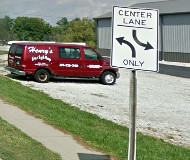8/21/2019
Ohio Appeals Court Rules On Defective Traffic Sign DefenseCitations can be canceled if a traffic sign is at the wrong height, but that does not invalidate the traffic stop, Ohio Court of Appeals ruled.

Proving a traffic sign does not meet legal requirement may get you out of an Ohio speeding ticket, but it will not stop you from being pulled over. The state Court of Appeals last week refused to overturn a drunk driving conviction, even though the reason for the initial traffic stop was invalid because of a misadjusted sign.
Hezekiah Norman, 55, tried to suppress the evidence that Ohio State Highway Patrol trooper D.R. Passet gathered after his BMW was pulled over in Mansfield on November 25, 2017. Norman had just made a left turn from the right lane of Trimble Road, even though a sign indicated such a turn could only be made from the center lane.
Norman pointed out that all traffic signs must be in compliance with the Manual of Uniform Traffic Control Devices (MUTCD), as adapted by Ohio. The sign in question, however, was not positioned at the height specified in the manual.
"No provision of this chapter for which signs are required shall be enforced against an alleged violator if at the time and place of the alleged violation an official sign is not in proper position and sufficiently legible to be seen by an ordinarily observant person," Ohio Code Section 4511.12 states.
The MUTCD specifies many factors, including the size, positioning, reflectivity, colors and even the fonts used for official roadside signs. All of these aspects are standardized so that drivers are able to see a sign and quickly recognize the information being conveyed. The three-judge appellate panel concluded that even if the reason for the stop turned out to be invalid because of the signage, the traffic stop itself was legitimate.
"There is no criminal liability for violation of a traffic control device that is unofficial, ie., not in conformity with the OMUTCD," Judge John Wise wrote for the court. "Nonetheless, it is well-established that an officer's reasonable articulable suspicion does not require proof beyond a reasonable doubt that the defendant's conduct has satisfied the elements of the offense."
In particular, the court noted the difficulty police officers would have in knowing what signs were legitimate and which ones were not while driving around on patrol.
"It would be unreasonable for this court to conclude that in the usual instance a law enforcement officer is constitutionally required to ensure that a traffic control sign's size or height measurement is OMUTCD-compliant before effectuating a traffic stop for a suspected violation of R.C. 4511.12," Judge John Wise concluded.
The lower court had sentenced Norman to three days in jail, a $250 fine and a six-month license suspension. A copy of the ruling is available in a 50k PDF file at the source link below.


